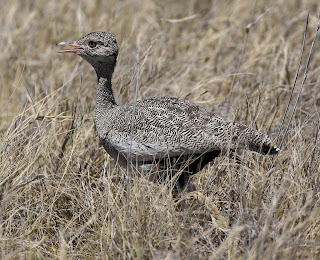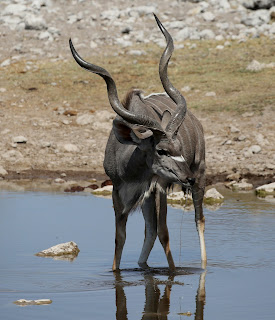Black faced Impala & Springbok at Goas.
Male Lion
Game coming in to drink at Okerfontein.
This is a lovely spot to dally for a while.
Giraffe
This mother & baby Elephant were not with
a herd & very very skittish.
White Rhino on the edge of the pan.
This is a lovely spot to dally for a while.
Giraffe
This mother & baby Elephant were not with
a herd & very very skittish.
White Rhino on the edge of the pan.
It was time to leave Halali Camp
on 11th September &
we were up early both feeling much better, but not on top form. We broke camp
& drove to Goas Waterhole &
across to Okerfontein Waterhole
which was very scenic with lots of the common plains game. We also saw a White Rhino, which is a bit of a rarity
in Etosha.
After a nice picnic lunch we continued to Namutoni Camp via the various waterholes, with Chudop being the most lively.
We left the park & drove to our campsite in Onguma. This is the third time I have stayed here & it is always a delight (much better facilities than in the national park). We made camp & celebrated by locking the vehicle keys in the truck! How this happened I have no idea! Took us a while to break back in. Nice evening around camp.
Chudop Waterhole
After a nice picnic lunch we continued to Namutoni Camp via the various waterholes, with Chudop being the most lively.
The waterhole at Onguma.
We left the park & drove to our campsite in Onguma. This is the third time I have stayed here & it is always a delight (much better facilities than in the national park). We made camp & celebrated by locking the vehicle keys in the truck! How this happened I have no idea! Took us a while to break back in. Nice evening around camp.
Looking towards Fischer's Pan.
There are a few Palm trees dotting the landscape
around the edges of the pan.
On 12th September we
re-entered the park & drove to Two
Palms on the eastern edge of Fischer’s
Pan. On arriving there we found that one of the trees had fallen over &
died! This waterhole may have to be re-named!
Hundreds of Springbok & Zebra
were passing this area.
We continued around & found the most amazing concentration of plains
game just before we re-joined the main road again. Possibly around 1,500 large
mammals present: mainly Plains Zebra; Blue Wildebeest & Springbok but also
good number of Gemsbok. It really was a tremendous sight.
Giraffes are always found at Tsumoor.
But they had to make way for the Elephants!
We continued north stopping at Tsumoor
Waterhole & then took the edge of the pan road via Stinkwater & on to the Andoni
Flats. Good numbers of game around the waterhole. There is always something
of interest at this location. We then returned to our camp at Onguma.
Dik-Dik
It just shows how small they are when
they are next to Elephant dung!
Lappet faced Vulture
Lappet, White backed Vultures & Bateleur.
A second bird came in to drink.
A pair of South African Shelduck
Pied Avocet
They made a fine sight flying over the waterhole.
This is a localised species, only appearing
when the water conditions are just right.
The next morning (13th)
we were up early & we drove a similar routing, but first stopping at Klein Numatoni Waterhole & then
driving Dik-Dik Drive which
delivered on Dik-Diks!
We visited both Klein & Groot Okevi Waterholes before heading north once more to the Andoni Flats. Yet again the waterhole on he flats was teeming with game & we stopped for a while there.
Spotted Hyena
There were three Hyenas running approximately
50 m apart in parallel.
This individual heard the camera click!
Damara Red billed Hornbill
Swallow tailed Bee-eaters always add a dash of
colour to this arid landscape.
There were three Hyenas running approximately
50 m apart in parallel.
This individual heard the camera click!
The very uncommon & localised
Red necked Falcon
African Grey Hornbill
Damara Red billed Hornbill
Swallow tailed Bee-eaters always add a dash of
colour to this arid landscape.
Gemsbok
A typical Etosha scene.
Bat eared Fox
Although this species can be quite common,
they are often nocturnal.
This pair were far out on the edge of
the pan in the morning.
Huge ears!
Burchell's Sandgrouse
Nice male.
Double banded Courser
Quite common in this ultra dry habitat.
Black Crow
The waterhole at Andoni Flats.
A typical Etosha scene.
Bat eared Fox
Although this species can be quite common,
they are often nocturnal.
This pair were far out on the edge of
the pan in the morning.
Huge ears!
Burchell's Sandgrouse
Nice male.
Double banded Courser
Quite common in this ultra dry habitat.
Black Crow
The waterhole at Andoni Flats.
We visited both Klein & Groot Okevi Waterholes before heading north once more to the Andoni Flats. Yet again the waterhole on he flats was teeming with game & we stopped for a while there.
Damara Red billed Hornbill
Crimson breasted Boubou
Once you arrive here the birds come.
Southern Pied Babbler
This individual is using its foot to secure a food item.
We enjoyed a lovely lunch stop in the nearby picnic site with attendant
Southern Pied Babblers.
Then we drove to the up-market Onkoshi Camp for a drink & a look around. A nice place in a
stunning but barren setting. We called in at Tsumcor on the way back which had a herd of Eland until a group of a group of Elephants came to entertain
us. And that was another day gone! Time flies on a trip such as this.
Onkoshi Camp
This is a very upmarket camp!
Is is right on the edge of the pan.
Eland
Kudu
14th September was our last day in Etosha. We drove west after a brief look at Klein Numatoni
waterhole to Chudop & Kalkheuwel Waterholes. The latter being
particularly interesting with lots of game coming & going.
These were the first bulls we had seen for a while.
It was then on to Okerfontein
Waterhole which is in a very scenic spot close to the edge of the pan. Lots
of activity here including three huge bull Elephants.
White browed Scrub Robin
We arrived back at camp close to 3pm & set about dismantling part of
our camp. We are eating out in the restaurant this evening.
We have been in Etosha for
eighteen nights & it has been a fabulous experience as always. However the
drought has taken its toll & birding was particularly poor. Many so called
common species being totally absent. We also had a few days of high winds &
attendant sand storms, which wasn’t nice. Game viewing was good, but no spotted
cats! I can’t believe it! Normally we do well with both Leopard & Cheetah
here.
Birds:
Common Ostrich; Red-billed Spurfowl; Helmeted Guineafowl; Egyptian Goose; South African Shelduck; Cape Teal; Southern Red-billed Hornbill; Southern Yellow-billed Hornbill; African Grey Hornbill; Violet Wood-hoopoe; Common Scimitarbill; Lilac-breasted Roller; Purple Roller; Swallow-tailed Bee-eater; European Bee-eater; Meyer's Parrot; African Palm Swift; Grey Go-away-bird; Southern White-faced Owl; Spotted Eagle-Owl; Pearl-spotted Owlet; Fiery-necked Nightjar; Cape Turtle Dove; Emerald-spotted Wood Dove; Kori Bustard; Red-crested Korhaan; Northern Black Korhaan; Namaqua Sandgrouse; Burchell's Sandgrouse; Marsh Sandpiper; Wood Sandpiper; Common Sandpiper; Little Stint; Pied Avocet; Kittlitz's Plover; Three-banded Plover; Blacksmith Lapwing; Crowned Lapwing; Double-banded Courser; White-backed Vulture; Lappet-faced Vulture; Bateleur; Pale Chanting Goshawk; Gabar Goshawk; Tawny Eagle; Martial Eagle; Greater Kestrel; Red-necked Falcon; Grey Heron; Western Cattle Egret; Greater Flamingo; Cape Crow; Pied Crow; Fork-tailed Drongo; Brown-crowned Tchagra; Crimson-breasted Shrike; Marico Flycatcher; White-browed Scrub Robin; Kalahari Scrub Robin; Cape Glossy Starling; Burchell's Starling; Red-breasted Swallow; African Red-eyed Bulbul; Rattling Cisticola; Black-chested Prinia; Yellow-breasted Apalis; Grey-backed Camaroptera; Long-billed Crombec; Southern Pied Babbler; Chestnut-vented Tit-Babbler; Fawn-coloured Lark; Sabota Lark; Chestnut-backed Sparrow-Lark; Grey-backed Sparrow-Lark; Red-capped Lark; Pink-billed Lark; White-bellied Sunbird; Great Sparrow; Southern Grey-headed Sparrow; Scaly-feathered Finch; White-browed Sparrow-Weaver; Sociable Weaver; Southern Masked Weaver; Red-billed Quelea; Violet-eared Waxbill; Red-headed Finch; Black-throated Canary; Yellow Canary; White-throated Canary; Lark-like Bunting
Birds:
Common Ostrich; Red-billed Spurfowl; Helmeted Guineafowl; Egyptian Goose; South African Shelduck; Cape Teal; Southern Red-billed Hornbill; Southern Yellow-billed Hornbill; African Grey Hornbill; Violet Wood-hoopoe; Common Scimitarbill; Lilac-breasted Roller; Purple Roller; Swallow-tailed Bee-eater; European Bee-eater; Meyer's Parrot; African Palm Swift; Grey Go-away-bird; Southern White-faced Owl; Spotted Eagle-Owl; Pearl-spotted Owlet; Fiery-necked Nightjar; Cape Turtle Dove; Emerald-spotted Wood Dove; Kori Bustard; Red-crested Korhaan; Northern Black Korhaan; Namaqua Sandgrouse; Burchell's Sandgrouse; Marsh Sandpiper; Wood Sandpiper; Common Sandpiper; Little Stint; Pied Avocet; Kittlitz's Plover; Three-banded Plover; Blacksmith Lapwing; Crowned Lapwing; Double-banded Courser; White-backed Vulture; Lappet-faced Vulture; Bateleur; Pale Chanting Goshawk; Gabar Goshawk; Tawny Eagle; Martial Eagle; Greater Kestrel; Red-necked Falcon; Grey Heron; Western Cattle Egret; Greater Flamingo; Cape Crow; Pied Crow; Fork-tailed Drongo; Brown-crowned Tchagra; Crimson-breasted Shrike; Marico Flycatcher; White-browed Scrub Robin; Kalahari Scrub Robin; Cape Glossy Starling; Burchell's Starling; Red-breasted Swallow; African Red-eyed Bulbul; Rattling Cisticola; Black-chested Prinia; Yellow-breasted Apalis; Grey-backed Camaroptera; Long-billed Crombec; Southern Pied Babbler; Chestnut-vented Tit-Babbler; Fawn-coloured Lark; Sabota Lark; Chestnut-backed Sparrow-Lark; Grey-backed Sparrow-Lark; Red-capped Lark; Pink-billed Lark; White-bellied Sunbird; Great Sparrow; Southern Grey-headed Sparrow; Scaly-feathered Finch; White-browed Sparrow-Weaver; Sociable Weaver; Southern Masked Weaver; Red-billed Quelea; Violet-eared Waxbill; Red-headed Finch; Black-throated Canary; Yellow Canary; White-throated Canary; Lark-like Bunting
Off to Delana’s ranch in the
morning for a week’s stay, yet another leg on this little adventure of ours.



























































































No comments:
Post a Comment